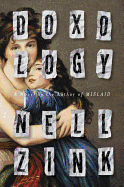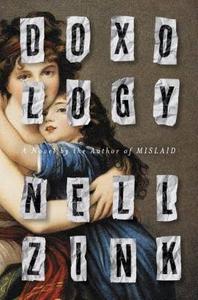
 Wrapped in the cloak of a social novel that spans three decades of American life beginning in the 1980s, Nell Zink's Doxology is a tender story about what it means to be a good person and a good parent in trying times. "Doxology" refers to a liturgical formula, but also hints at the practice of "doxing," or exposing a person's private information online.
Wrapped in the cloak of a social novel that spans three decades of American life beginning in the 1980s, Nell Zink's Doxology is a tender story about what it means to be a good person and a good parent in trying times. "Doxology" refers to a liturgical formula, but also hints at the practice of "doxing," or exposing a person's private information online.
The protagonists are Daniel and Pam Svoboda, who establish their first marital abode in 1991 in an illegal one-room apartment above a video store on the Lower East Side, where they're joined by a daughter, Flora, the following year. Pam, determined to become a "retro hippie earth mother," has been living in New York City and working as a computer programmer since fleeing the strict discipline of her parents' home and dropping out of high school at age 17. Daniel's an "eighties hipster" who barely moves a rung up the economic ladder--from law firm proofreader to long-term temporary office assistant--over the novel's span. Their lives orbit around an unlikely "rock god," Joe Harris, who doubles as a not entirely reliable part-time caretaker for Flora.
When the terror attacks of 9/11 coincide with a devastating event in the life of the Svoboda family, Pam and Daniel remain in New York but send nine-year-old Flora to live in Washington with her maternal grandparents, whose ideas about parenting have become considerably more flexible. It's an unusual domestic arrangement that allows Zink (Mislaid) to explore parenthood's joys and burdens in a multigenerational setting. Educated at the elite Cathedral School and George Washington University, Flora evolves into an idealistic young woman whose "career goal was to hold global warming to under two degrees Celsius." But as Zink wryly notes, in one of the novel's many witty thrusts, "The appropriate college major for that would have been World Domination."
Through the lives of the Svobodas, readers experience the Great Recession and the election of Donald Trump, an event that brings into conflict the romantic relationships of Flora, a campaign staffer for the Green Party. This forces her to make a fateful personal choice that will determine her role in nurturing the family's next generation. Zink is a sharp observer of current events, whose digressions on subjects that include New York real estate, startups and both the beauty of idealism and its limits are highlights of the novel.
Doxology circles around a coterie of gentle, likable characters who seem to find the task of navigating their tangled personal lives as difficult as confronting the challenges of an increasingly complicated world. As they make their amiable, if sometimes stumbling, way, more than a few readers will see in their story reflections of their own lives. --Harvey Freedenberg, freelance reviewer
Shelf Talker: A small family surfs the world's dramatic changes as the 20th century becomes the 21st.

